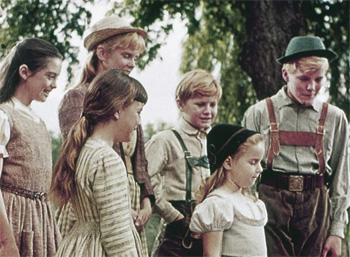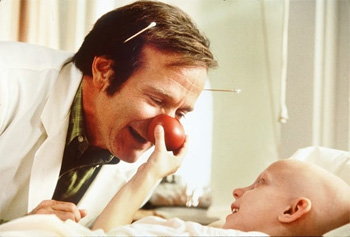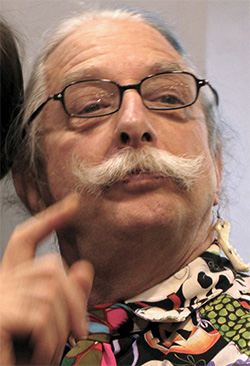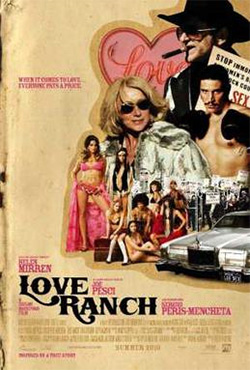5 Movie Behind-The-Scenes Controversies

Behind the scenes of movies are a bunch of actors and directors who torture and injure each other on the daily. But behind those scenes are a bunch of executives in business attire debating procedure in meeting rooms, and this part, believe it or not, can be pretty interesting too. Just look back to the time that ...
Sound Of Music And Salzburg Squared Off On Whether They Could Drape The City In Swastikas.
You might think The Sound Of Music is a childhood classic filled with an almost unbearable measure of syrupy sentimentalism. That's even though the movie has a bunch of Nazis, and in the stage version, the nauseatingly adorably children dance in front of giant Nazi banners. If you're of a certain age and rewatch the film, all those swastikas might be a teensy bit harder to swallow now, thanks to the current climate. But if you seriously think Nazism is touchier subject now than when the movie was shot in 1964, just two decades after World War II, well, don't say that aloud. Boomers will laugh at you, and they'll be right to.

In the years after the war, the nations of Europe passed all kinds of laws banning the display of Nazi symbols like the ones in the film. Germany itself was the strictest about this, and until just a couple years ago, even video games like the new Wolfenstein couldn't include Nazi symbols in Germany (and video game Hitler had to shave his mustache). Austria has similar laws, but these have exceptions for films. So when the makers of Sound Of Music wanted to hang Nazi flags for their Salzburg shoots, city officials could have said yes.
They said no. They didn't want to dredge up all those Nazi memories, they said. They especially objected to the way the movie planned to portray crowds openly welcoming the Nazis' arrival. "The people of Salzburg weren't Nazi sympathizers!" they insisted. So Maurice Zuberano, a storyboard artist on the film, came up with a solution. They'd just use actual newsreels from the period. Which showed the actual people of Salzburg very much cheering on the Nazis' arrival right after Germany annexed Austria.
So, offered that tempting alternative which required zero city redecoration, Salzburg officials suddenly were willing to come back to the negotiation table. In the end, the film may not have included many huge scenes of crowds welcoming incoming troops, but they did get to hang all kinds of Nazi flags in choice places, which is how we got this scene, which you can now see reproduced in GIF format online at least three times daily.

Germany Barred Tom Cruise From Filming Valkyrie Because He's A Scientologist
So now that you know the challenges that come with recreating the Third Reich for the big screen, what do you think was the big controversy when MGM came to Germany to film 2008's Valkyrie? Was it all the Nazi banners they were putting up? No! Or, uh, actually yes, though that's not the not the main controversy we're here to talk about today. Some people did see swastikas going up in Berlin, with an absurd number of men marching below them in brown shirts, and put in a complaint with their local bureau of anti-Nazi affairs. But once that mix-up was taken care of, the German government still wasn't cool with the film.
The issue was the star, Tom Cruise, and his love of Scientology. Though you probably knew Cruise is a Scientologist, you manage not to think about that fact constantly whenever you watch one of his movies. Germany, on the other hand, pays special heed to people's religions. Unlike America's general hands-off policy, Germany regulates religions by formally recognizing some and rejecting others. For many years, they refused to recognize Jehovah's Witnesses as a legit religion, and they consistently do the same for Scientology, calling it a cult and a money-making scam.
If you're going to throw those accusations against any group, Scientology's a good candidate. But even so, Germany goes a little far with their anti-Dianetics crusade. The country labels businesses owned by Scientologists, makes government employees declare whether they're Scientologists, and even got Microsoft to remove their disk defragmenter from Windows when Germany discovered a Scientologist had designed it. When Valkyrie came to film, the country used Cruise's Scientologist status as a reason to block them from filming in several sites.
In the end, the producers got the Defense Ministry to walk back their decision, but for a while, the government argued that movie was a Scientologist plot to legitimize their cult with German children by appropriating German history. Officials compared this film to Nazis putting on the Olympics and compared Cruise to Joseph Goebbels. Which is a hyperbolic jump at the best of times but is an especially strange fit here since this movie features the actual Goebbels as a villain, and the main plot is Cruise's character trying to kill Hitler. Of course, people have also compared Germany's discrimination against Scientology to something the Nazis might do, and anyway, you know who else tried to kill Hitler? Hitler.
Patch Adams Says Universal Reneged On Their Promise To Fund His Hospital
The real-life Patch Adams hates the Patch Adams movie. Like basically all biopics (and this one's more slippery than most), the movie gives his real story the Hollywood treatment, stuff like changing a male friend of Adams' who got murdered into a female love interest and inventing a vaguely insulting subplot about him waiting till super late in life to go in for medicine. Adams also really objects to the movie's message that "laughter is the best medicine." He's never believed that. He has dressed as a clown to entertain sick kids and says humor and joy help people, but you'd have to be a nut to think laughter is treatment.

Adams' real mission wasn't so much "laughter as medicine" and more what they call holistic medicine, but most of all what they call free medicine. His main thing was giving free health care to the poor. That idea popped up a little in the movie, but it's an idea explored more easily by poring over ledgers than with balloon animals, so it didn't get a whole lot of focus. Giving free medicine also happens to be very expensive, which was why Adams sought fame and agreed to the movie. He thought this would fund the hospital he wanted to build.
That didn't happen. There were early reports of Universal pledging a half-million donation, but they stipulated that it could only be spent on constructing his planned hospital, and the hospital was never constructed, so it's unclear if he ever got the money. Anyway, it was about $50 million short of what he was seeking. In later years, he'd complain about never receiving anything out of the movie's profits (you gotta ask for a cut of the gross, Patch, and you have to get that in writing). And he got really bitter about Robin Williams earning $20 million for playing the part (other sources estimate $10 million) and giving absolutely none of it toward the cause that his character supported.

Funny thing though: Robin Williams actually did plenty for charity, including supporting hospitals. He just never gave anything to Adams' group, called the "Gesundheit! Institute." And maybe there's a reason for that. Know how we said you'd have to be a nut to believe laughter is the best medicine? Adams doesn't believe that exact thing, but he might still be kind of a nut. His treatment style says no one should take psychiatric drugs, and he says mental illnesses are all just symptoms of loneliness and can be treated using compassion alone. That's ... just wrong. And you might imagine that Williams, who suffered from serious depression, didn't think too highly of Adams calling depression a "selfish act" that's impossible if you love someone.
And speaking of inappropriate action in mental hospitals ...
Elf -- the last good Christmas movie ever made -- includes a bunch of scenes in a department store that definitely looks like Macy's flagship Manhattan location. They did in fact film those scenes on location in Macy's, and they planned to call the place Macy's in the movie. It's an iconic Christmas spot and would have tied the film to the classic Christmas movie Miracle on 34th Street. But Macy's made them leave their store's name out, and it was because of this scene:
Buddy the Elf sees Santa in the store but discovers that it isn't the actual Santa at all, just a guy in a costume. As department store Santa gags go, this is pretty tame. It avoids the usual joke about the guy being a sex offender or whatever, and he even smells of "beef and cheese" instead of the expected gin or weed. But Macy's rejected the scene. They contend that the Santa in their store is the REAL Santa, and they'll never say anything that indicates otherwise.
Up to this point, they were totally up for working with the filmmakers, even wanting to stick Buddy in their parade and put it in the movie, but they drew the line here. Director Jon Favreau refused to pull the scene, so he filmed it in a different location, the cafeteria of a Vancouver mental hospital. Other than the Canadian part, that wasn't as bad as it sounds. Anywhere can be cheery if you stick enough decorations up. But you can see that the scene is kind of cramped, and when Buddy and not-Santa fight, they don't get to wreak havoc through the whole store.

The film lost the right to use the "Macy's" name. Favreau decided to call the store Gimbel's instead, since Gimbel's was another iconic Manhattan location and had also featured in Miracle on 34th Street. He decided this even though Gimbel's had permanently closed 15 years earlier, in 1987. He tracked down the owners of the trademark, and rather than inking a mutually beneficial promotional partnership, he paid for the rights to use the name. Some viewers had to be left wondering why Elf features the pointless anachronism of a still-open Gimbel's, ruining the otherwise consistent realism of a film where sleighs fly using the power of belief.
Joe Pesci Sued Gotti For Cutting Him Out, Though He Gained 30 Pounds For The Role
When news first arrived about The Irishman, it sounded like a fantasy project pitched by fans on Twitter. Martin Scorsese was assembling a dream team for a mob movie, and while the final movie turned out to be more of a response or even a rebuke to old mob movies than the remake/reunion/reboot demanded up the tweeter who surely originally came up with the idea, everyone still agreed it was a hell of a return for those actors. Especially for Joe Pesci, who hadn't acted at all in 20 years, other than the occasional cameo or that one weird 2010 film that grossed only $100k.

Clearly, it took Martin Scorsese and Robert De Niro collaborating for their first full film since 1995's Casino (which also starred Pesci) to drag Joe Pesci out of retirement and back into the world of mob movies. Scorsese even said Pesci had been deeply reluctant to do a gangster film again. Except, you know the previous major mob movie to come out, 2018's Gotti, starring John Travolta? The one that bombed at the box office and has a rock-solid score of 0% on Rotten Tomatoes? Pesci had stepped up to join that film too, so his triumphant return to gangster films could have been a complete turd.
Oh, and he was really keen on his part in Gotti. To play the part of mobster Angelo Ruggiero, he gained 30 pounds, which sounds like the sort of experience that your body can probably do without when you're 75 years old. Or really ever. Enough with the torturing yourself for movie roles already. You can always put on some prosthetics, or just wear a thick sweater. But then the filmmakers cut Pesci from the role, though they did offer him a different role, with a reduced salary, to play a different guy, who's not even fat.
Pesci sued for millions. It wasn't exactly a straight breach of contract case, as he'd never had any contract or any other formal deal ... again, people: always get these agreements in writing. But it did result in Pesci receiving a settlement, and he'd go on to glory in a much better mob movie where the body transformations all came thanks to special effects. And now, Pesci is surely officially back, so his starring role in the NC-17 revival of Home Alone is no longer merely a possibility. It's guaranteed.
Follow Ryan Menezes on Twitter for other stuff no one should see.
Top image: New Line Cinema